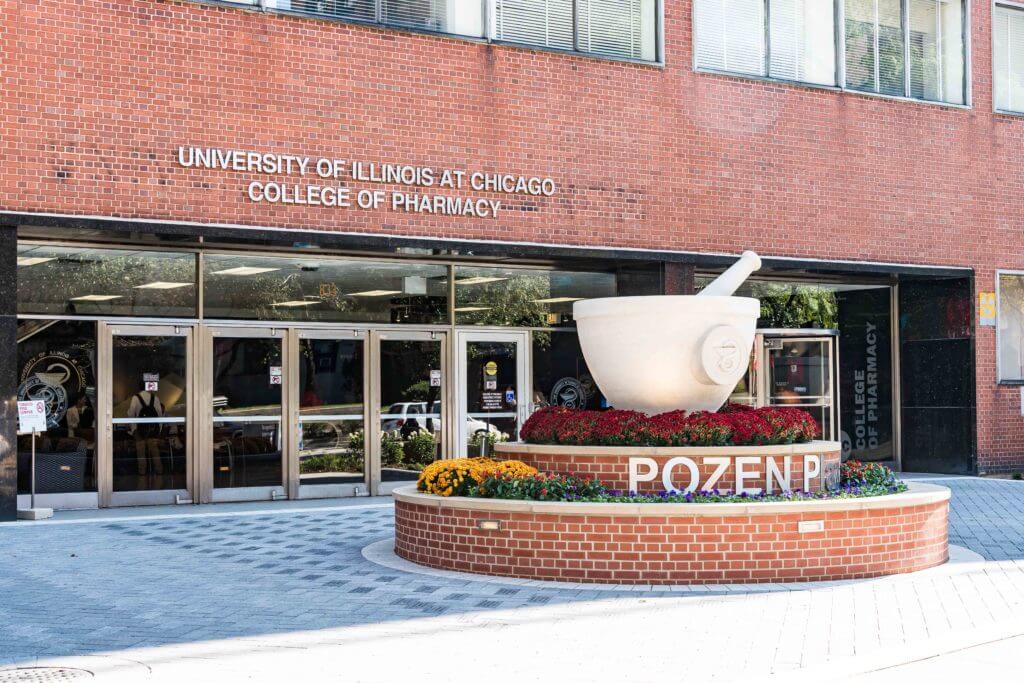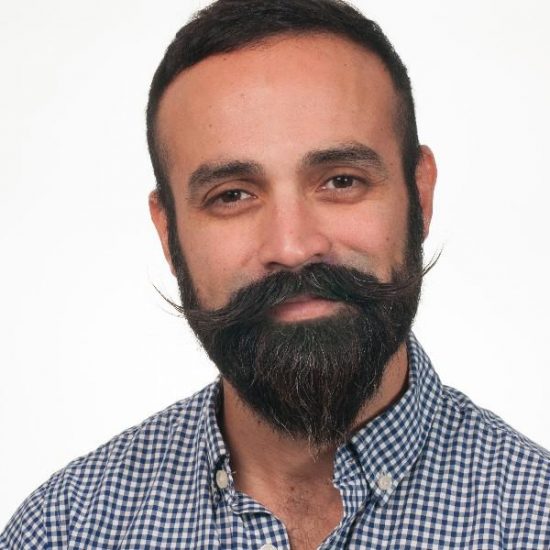Infectious Diseases
Location

Pharmacy residency training programs are held within the College of Pharmacy at the University of Illinois Chicago (UIC) and the University of Illinois Medical Center. The Department of Pharmacy Practice, the department of all residency trainees, is the most comprehensive unit of its type in the United States and continues a tradition of exemplary service through its mission of providing quality education, research, and patient care. The department educates and trains students, residents, and fellows as well as practicing pharmacists to become nationally recognized for their leadership, knowledge and competence in practice, research, and teaching.
Virtual Information Session
None are currently scheduled.
Program Information
The University of Illinois Hospital and Infectious Diseases Pharmacotherapy Section offers a one-year PGY2 residency in Infectious Diseases (ID). The goal of the program is to provide the incoming resident with opportunities to develop expertise in the practice of infectious diseases pharmacy as a key player in the interdisciplinary ID team. The Section of Infectious Diseases Pharmacotherapy has provided a wide range of scholarly, teaching, and clinical services to the University and the Chicagoland area since its inception in 1996.
This program will focus on developing the necessary clinical and didactic teaching, as well as research, skills needed to practice as an independent infectious diseases pharmacist. Upon successful completion of this program, residents will be prepared for advanced patient care, academic, or other specialized positions.
Program
Requirements and Expectations
General
- Doctor of Pharmacy degree from accredited program
- Valid PGY1 certificate
- Valid Illinois pharmacist license within 90 days of start date
- ACLS certification
- Able to start July 1st of calendar year
Research
- Quality Improvement/ Research project
- Completion of year-long literature review or comparable writing project summarized in written format acceptable for publication
- Poster submission to a national infectious diseases conference
Conferences
- Attendance of ASHP midyear meeting
- Attendance of a national ID conference (IDWEEK, MAD-ID)
Presentations
- Weekly Infectious Disease Conference (rotating between other ID trainees)
- One Continuing Education seminar
- Formal lecture for University of Illinois-Chicago College of Pharmacy (optional)
Other
- Minimum eight hours/day (Monday-Friday)
- Complete assignments and evaluations on a timely basis
- Participate in recruitment for incoming residency class
General
PGY2 pharmacy residency programs build on Doctor of Pharmacy (PharmD) education and PGY1 pharmacy residency programs to contribute to the development of clinical pharmacists in specialized areas of practice. PGY2 residencies provide residents with opportunities to function independently as practitioners by conceptualizing and integrating accumulated experience and knowledge and incorporating both into the provision of patient care or other advanced practice settings. Residents who successfully complete an accredited PGY2 pharmacy residency are prepared for advanced patient care, academic, or other specialized positions, along with board certification, if available.
Residency training programs in Pharmacy are held within the College of Pharmacy at the University of Illinois Chicago (UIC) and the University of Illinois Hospital and Health Sciences Center (UI Health). The Department of Pharmacy Practice, home department of all residency trainees, is the most comprehensive unit of its type in the United States and continues a tradition of exemplary service through its mission of providing quality education, research, and patient care. The department educates and trains students, residents, and fellows as well as practicing pharmacists to become nationally recognized for their leadership, knowledge and competence in practice, research, and teaching.
Orientation & Training
Residents who completed their PGY1 at the University of Illinois-Chicago and early commit will help the incoming PGY1 residents in orientation, review the PGY2 curriculum with the Residency Program Director (RPD), establish a research project topic, and review clinical topics with preceptors to ensure the resident is prepared. For new incoming residents who completed their PGY1 training elsewhere, the first 4 weeks of the program are dedicated to hospital and departmental orientation and training. This training will focus on hospital and departmental policies and guidelines, training in pertinent computer systems, and will introduce the resident to both non-clinical and clinical resources and services. The resident will complete infectious diseases and stewardship training both inpatient and in their selected clinic.
Learning Experiences
A customized rotation schedule is developed based on the resident’s self-identified strengths, weaknesses, interests, goals, and career path. Prior to July 1, the resident will meet with the RPD to discuss these topics and start to plan a rotation schedule. During the first few days of the program the resident will meet with the RPD to further discuss the upcoming year and start to customize a resident-specific schedule that will facilitate meeting the resident’s goals. The resident schedule will be discussed regularly throughout the year and on the quarterly developmental plans to allow for flexibility in the program to accommodate the resident’s interest development and career path. If the resident is interested, there are many opportunities to engage as a preceptor for both pharmacy students and PGY1 pharmacy residents.
Sequence of Learning Experiences
The infectious diseases resident will start their core rotations after the completion of orientation and training. The rotation sequence will be tailored to best meet the resident’s goals and the programs staffing requirements. Core rotations are 4 weeks and elective rotations are 2-4 weeks depending on the rotation but may be adjusted based on the experience and goals of the resident. The recommended sequence will be to start with infectious diseases consult service to build a foundational knowledge and form relationships with the other interdisciplinary team members.
TS&F
Required Rotations
- Hospital orientation (non-UIC PGY1 residents) – 4 weeks
- Infectious diseases consult 1 (general) – 4 weeks
- Infectious diseases consult 2 (transplant/ immunocompromised) – 4 weeks
- Antimicrobial stewardship – 4 weeks
- Microbiology/clinical research – 4 weeks
Longitudinal Rotations, Required
- Infectious diseases clinic – half-day/week
- May complete at Family Center for Infectious Diseases (FCID), CORE Center (Cook County Health), C. difficile clinic at Loyola Medicine, Illinois Department of Corrections (IDOC) HIV clinic (Telemedicine)
- Longitudinal research
- Leadership Certificate Program (half-day/month)
- On-call program (approx. 1 shift/ month, 1700-0800)
Elective Rotations
- Infectious diseases consult (Stroger Hospital – general ID) – 4 weeks
- Infectious diseases consult (Loyola – immunocompromised ID) = 4 weeks
- Community Antimicrobial Stewardship (St. Anthony’s Hospital) – 4 weeks
- Pediatric Infectious Disease (Lurie Children’s Hospital) – 4 weeks
- HIV Consult service (Stroger Hospital) – 4 weeks
- OPAT Clinic (Jesse Brown VA) – 4 weeks
- Infectious Disease Clinical Research (active clinical trials) – 2 weeks
- Medical ICU – 4 weeks
- Hepatitis C clinic – 2 weeks
Preceptors
Rodrigo Burgos, PharmD
Clinical Assistant Professor
Clinical Pharmacist, HIV/Infectious Diseases
Director, PGY2 Infectious Diseases Pharmacy Residency
Alan Gross, PharmD, BCIDP
Clinical Associate Professor
Clinical Pharmacist, Infectious Diseases
Alfredo J. Mena-Lora, MD, FACP
Assistant Professor of Medicine
Director, ID Fellowship
Sarah Michienzi, PharmD, BCPS, AAHIVP
Clinical Assistant Professor
Clinical Pharmacist, HIV Care
Eric Wenzler, PharmD, BCIDP
Assistant Professor
Clinical Pharmacist, Infectious Diseases
Melissa Badowski, PharmD, BCIDP, AAHIVP
Clinical Associate Professor
Clinical Pharmacist, HIV/Infectious Diseases
Renata Smith, PharmD
Clinical Assistant Professor
Clinical Pharmacist, HIV/Infectious Diseases
Robert C. Glowacki, PharmD
Clinical Assistant Professor
Clinical Pharmacist, HIV/Infectious Diseases
Keith Rodvold, PharmD
Distinguished Professor
Co-Director, Section of Infectious Diseases Pharmacotherapy
Colleges of Pharmacy and Medicine
Larry Danziger, PharmD
Distinguished Professor, College of Pharmacy – Pharmacy Practice
Professor of Pharmacy in Medicine, College of Medicine – Medicine
Executive Director, Center for Advanced Design, Research and Exploration
Co-Director, Section of Infectious Diseases Pharmacotherapy, College of Pharmacy – Pharmacy Practice
Current Resident
2024 – 2025 Tony Duong
History
2020 – 2021 – Fischer Herald
